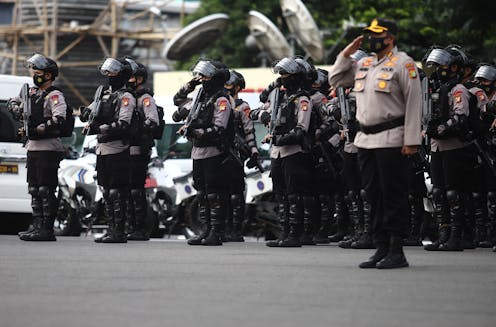Is using AI tools innovation or exploitation? 3 ways to think about the ethics
- Written by Leo S. Lo, Dean and Professor, College of University Libraries and Learning Sciences, University of New Mexico

Artificial intelligence can be used in countless ways – and the ethical headaches it raises are countless, too.
Consider “adult content creators” – not necessarily the first field that comes to mind. In 2024, there was a surge in AI-generated influencers[1] on Instagram: fake models with faces made by AI, attached to stolen photos and videos of real models’ bodies. Not only did the original content creators not consent to having their images used, but they were not compensated.
Across industries, workers encounter more immediate ethical questions about whether to use AI every day. In a trial by the U.K.-based law firm Ashurst, three AI systems dramatically sped up document review[2] but missed subtle legal nuances that experienced lawyers would catch. Similarly, journalists must balance AI’s efficiency for summarizing background research with the rigor required by fact-checking standards.
These examples highlight the growing tension between innovation and ethics. What do AI users owe the creators whose work forms the backbone of those technologies? How do we navigate a world where AI challenges the meaning of creativity – and humans’ role in it?
As a dean overseeing university libraries[3], academic programs and the university press, I witness daily how students, staff and faculty grapple with generative AI[4]. Looking at three different schools of ethics can help us go beyond gut reactions to address core questions about how to use AI tools with honesty and integrity.
Rights and duties
At its core, deontological ethics[5] asks what fundamental duties people have toward one another – what’s right or wrong, regardless of consequences.
Applied to AI, this approach focuses on basic rights and obligations. Through this lens, we must examine not only what AI enables us to do, but what responsibilities we have toward other people in our professional communities.
For instance, AI systems often learn by analyzing vast collections of human-created work, which challenges traditional notions of creative rights[6]. A photographer whose work was used to train an AI model might question whether their labor has been appropriated without fair compensation – whether their basic ownership of their own work has been violated.
On the other hand, deontological ethics also emphasizes people’s positive duties toward others – responsibilities that certain AI programs can assist in fulfilling. The nonprofit Tarjimly[7] aims to use an AI-powered platform to connect refugees with volunteer translators. The organization’s AI tool also gives real-time translation, which the human volunteers can revise for accuracy.
This dual focus on respecting creators’ rights while fulfilling duties to other people illustrates how deontological ethics can guide ethical AI use.
AI’s implications
Another approach comes from consequentialism, a philosophy that evaluates actions by their outcomes[9]. This perspective shifts focus from individuals’ rights and responsibilities to AI’s broader effects. Do the potential boons of generative AI justify the economic and cultural impact? Is AI advancing innovation at the expense of creative livelihoods?
This ethical tension of weighing benefits and harms drives current debates – and lawsuits[10]. Organizations such as Getty Images[11] have taken legal action to protect human contributors’ work from unauthorized AI training. Some platforms that use AI to create images, such as DeviantArt[12] and Shutterstock[13], are offering artists options to opt out or receive compensation, a shift toward recognizing creative rights in the AI era.
The implications of adopting AI extend far beyond individual creators’ rights and could fundamentally reshape creative industries. Publishing, entertainment and design sectors face unprecedented automation, which could affect workers along the entire production pipeline, from conceptualization to distribution.
These disruptions have sparked significant resistance. In 2023, for example, labor unions for screenwriters and actors initiated strikes[14] that brought Hollywood productions to a halt.
A consequentialist approach, however, compels us to look beyond immediate economic threats, or individuals’ rights and responsibilities, to examine AI’s broader societal impact. From this wider perspective, consequentialism suggests that concerns about social harms must be balanced with potential societal benefits.
Sophisticated AI tools are already transforming fields such as scientific research, accelerating drug discovery[16] and climate change solutions[17]. In education, AI supports personalized learning for struggling students[18]. Small businesses and entrepreneurs in developing regions can now compete globally[19] by accessing professional-level capabilities once reserved for larger enterprises.
Even artists need to weigh the pros and cons of AI’s impact: It’s not just negative. AI has given rise to new ways to express creativity[20], such as AI-generated music and visual art. These technologies enable complex compositions and visuals that might be challenging to produce by hand – making it an especially valuable collaborator for artists with disabilities.
Character for the AI era
Virtue ethics, the third approach, asks how using AI shapes who users become as professionals and people. Unlike approaches that focus on rules or consequences, this framework[21] centers on character and judgment.
Recent cases illustrate what’s at stake. A lawyer’s reliance[22] on AI-generated legal citations led to court sanctions, highlighting how automation can erode professional diligence. In health care, discovering racial bias in medical AI chatbots[23] forced providers to confront how automation might compromise their commitment to equitable care.
These failures reveal a deeper truth: Mastering AI requires cultivating sound judgment. Lawyers’ professional integrity demands that they verify AI-generated claims. Doctors’ commitment to patient welfare requires questioning AI recommendations that might perpetuate bias. Each decision to use or reject AI tools shapes not just immediate outcomes but professional character.
Individual workers often have limited control over how their workplaces implement AI, so it is all the more important that professional organizations develop clear guidelines. What’s more, individuals need space to maintain professional integrity within their employers’ rules to exercise their own sound judgment.
Beyond asking “Can AI do this task?” organizations should consider how its implementation could affect workers’ professional judgment and practice. Right now, technology is evolving faster than collective wisdom in using it, making deliberate reflection and virtue-driven practice more essential than ever.
Charting a path forward
Each of these three ethical frameworks illuminates different aspects of our society’s AI dilemma.
Rights-based thinking highlights our obligations to creators whose work trains AI systems. Consequentialism reveals both the broader benefits of AI democratization and its potential threats, including to creative livelihoods. Virtue ethics shows how individual choices about AI shape not just outcomes but professional character.
Together, these perspectives suggest that ethical AI use requires more than new guidelines. It requires rethinking how creative work is valued.
The debate about AI often feels like a battle between innovation and tradition. But this framing misses the real challenge: developing approaches that honor both human creativity and technological progress and allow them to enhance each other. At its core, that balance depends on values.
References
- ^ AI-generated influencers (www.wired.com)
- ^ sped up document review (news.bloomberglaw.com)
- ^ a dean overseeing university libraries (ulls.unm.edu)
- ^ grapple with generative AI (scholar.google.com)
- ^ deontological ethics (plato.stanford.edu)
- ^ challenges traditional notions of creative rights (www.cjr.org)
- ^ The nonprofit Tarjimly (apnews.com)
- ^ AP Photo/Juliana Yamada (newsroom.ap.org)
- ^ evaluates actions by their outcomes (plato.stanford.edu)
- ^ and lawsuits (www.hollywoodreporter.com)
- ^ Getty Images (newsroom.gettyimages.com)
- ^ DeviantArt (www.deviantart.com)
- ^ Shutterstock (support.submit.shutterstock.com)
- ^ initiated strikes (www.brookings.edu)
- ^ cofotoisme/E+ via Getty Images (www.gettyimages.com)
- ^ accelerating drug discovery (doi.org)
- ^ climate change solutions (www.weforum.org)
- ^ personalized learning for struggling students (hai.stanford.edu)
- ^ compete globally (moderndiplomacy.eu)
- ^ new ways to express creativity (hai.stanford.edu)
- ^ this framework (plato.stanford.edu)
- ^ A lawyer’s reliance (www.reuters.com)
- ^ discovering racial bias in medical AI chatbots (apnews.com)
Authors: Leo S. Lo, Dean and Professor, College of University Libraries and Learning Sciences, University of New Mexico


